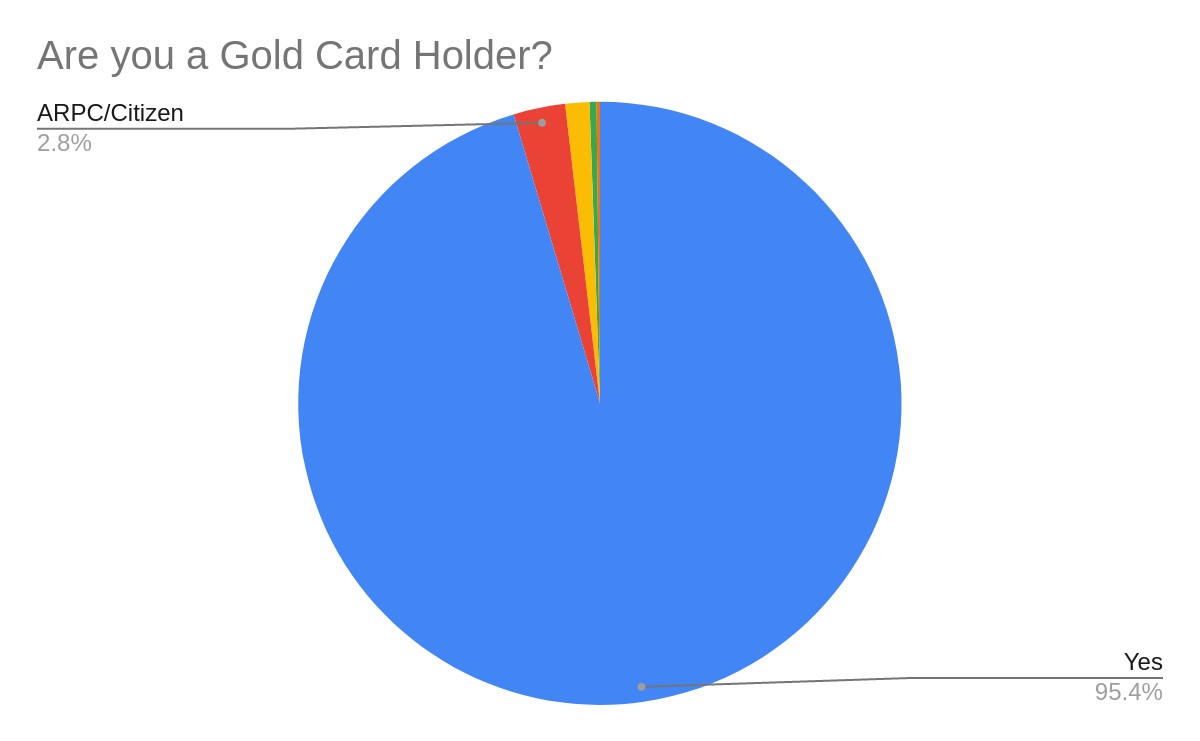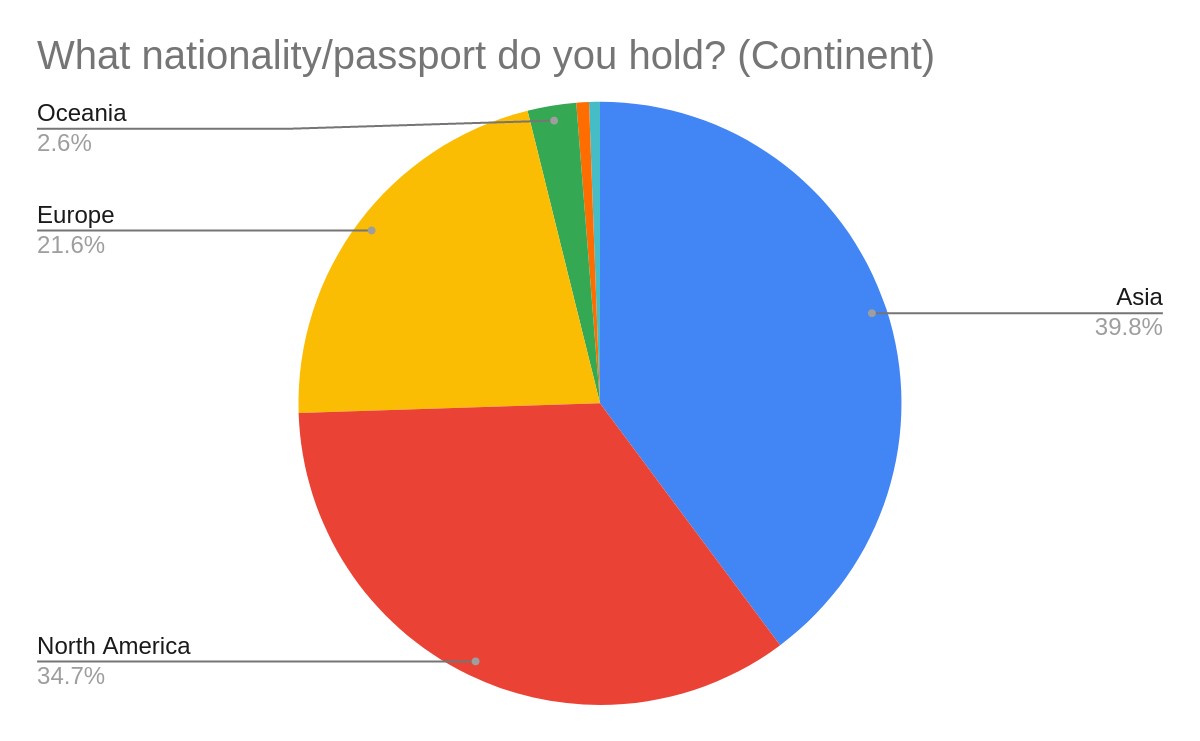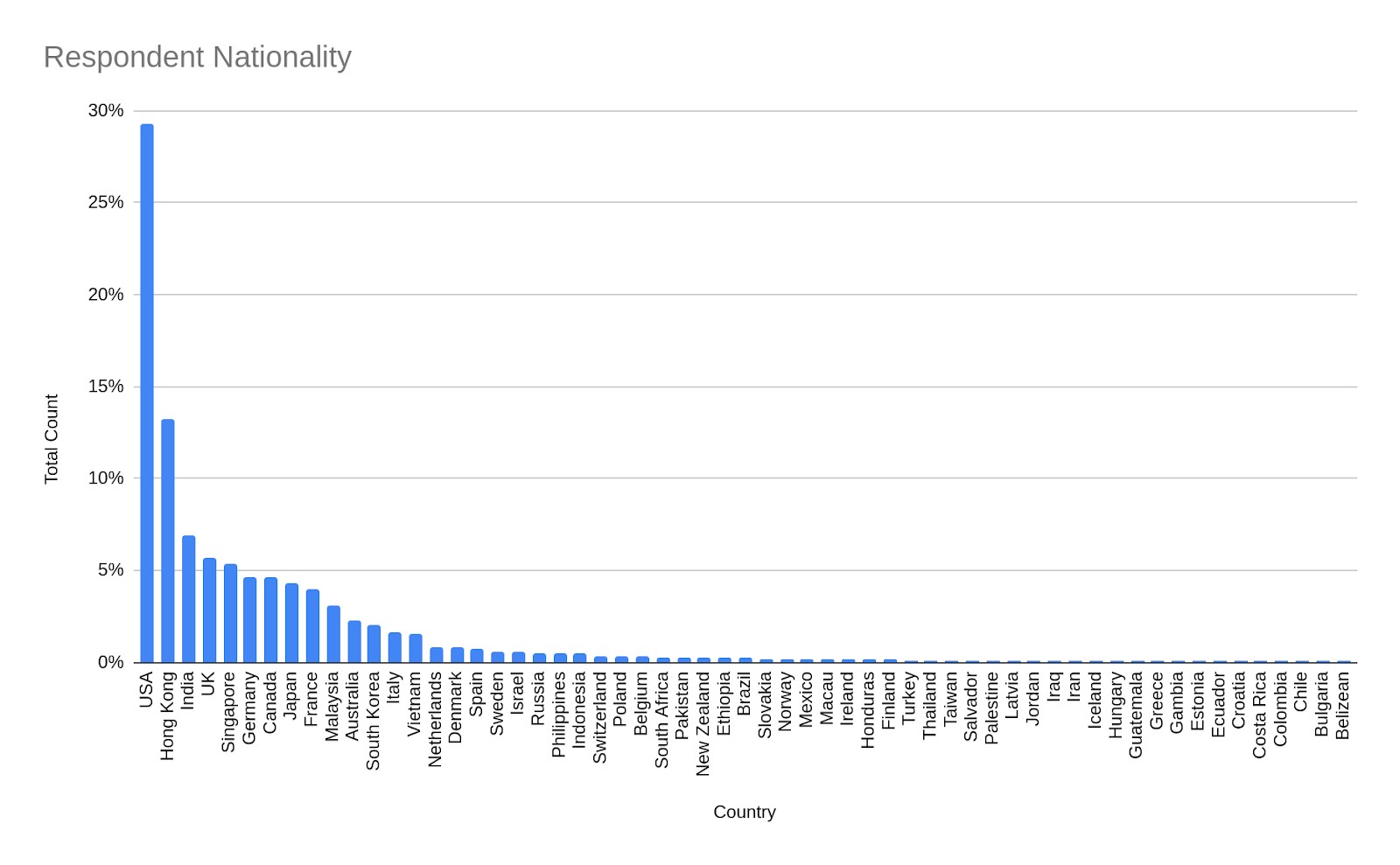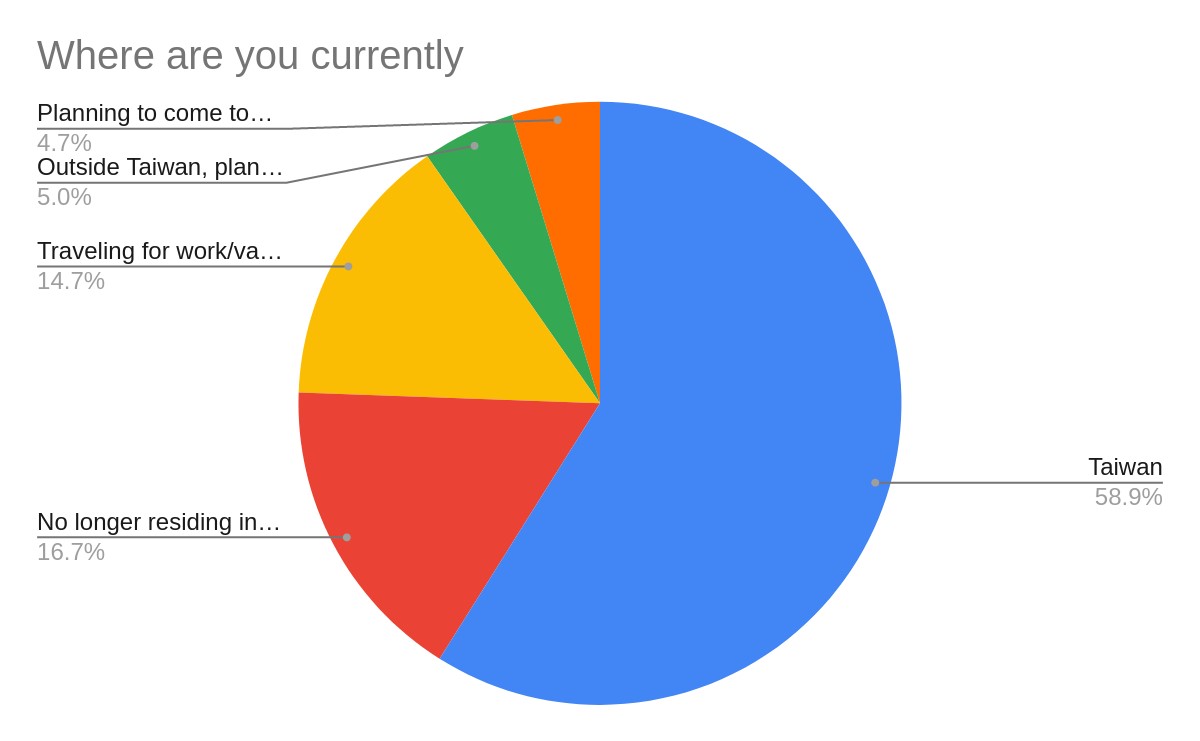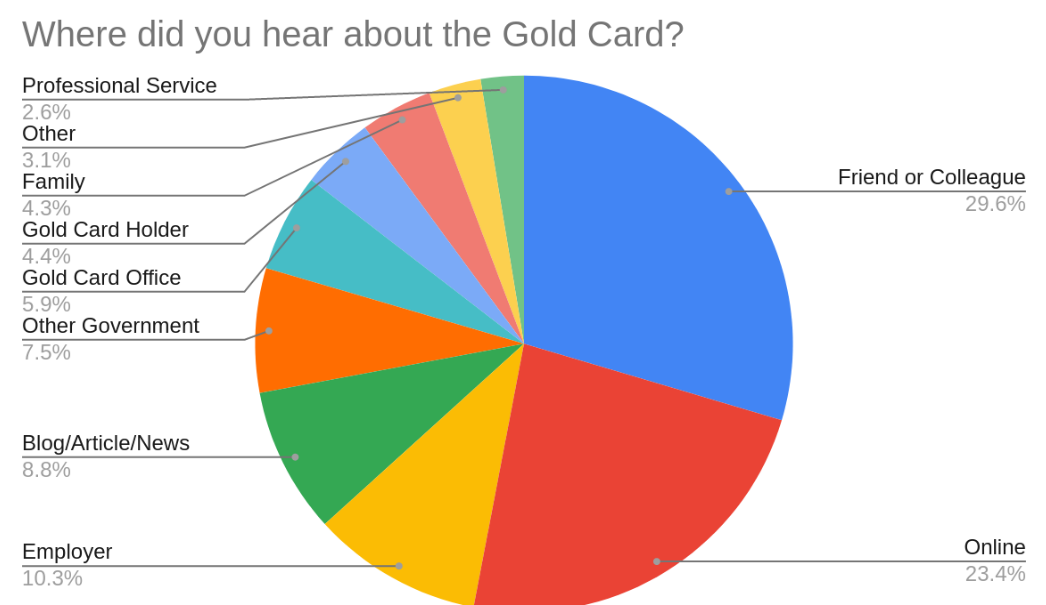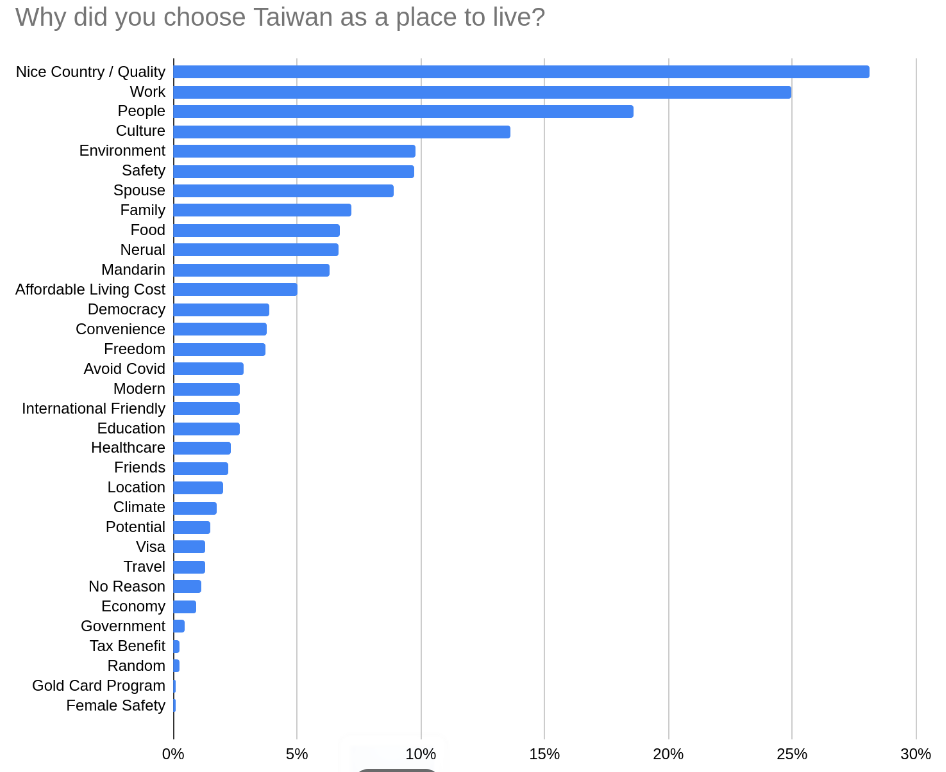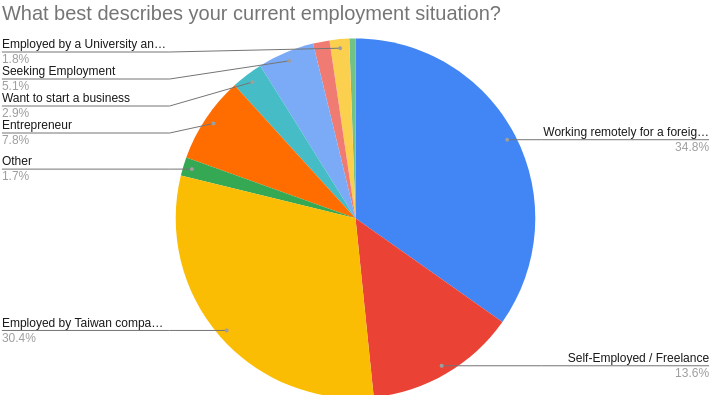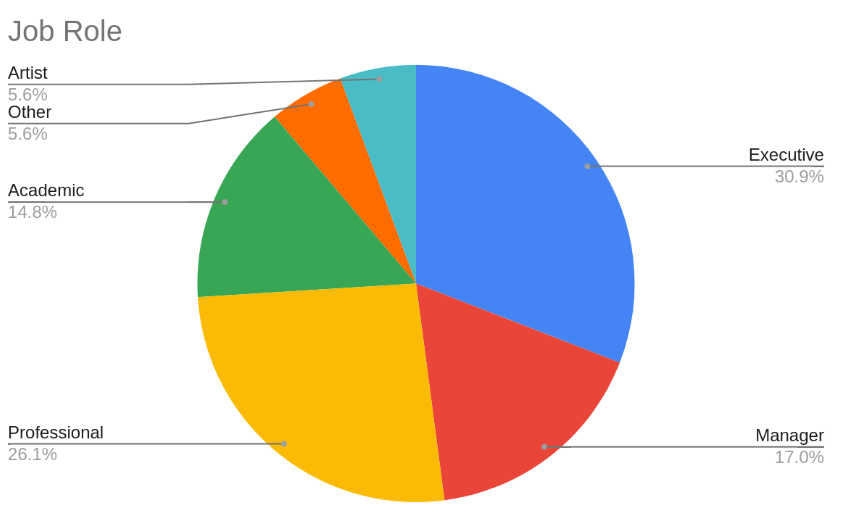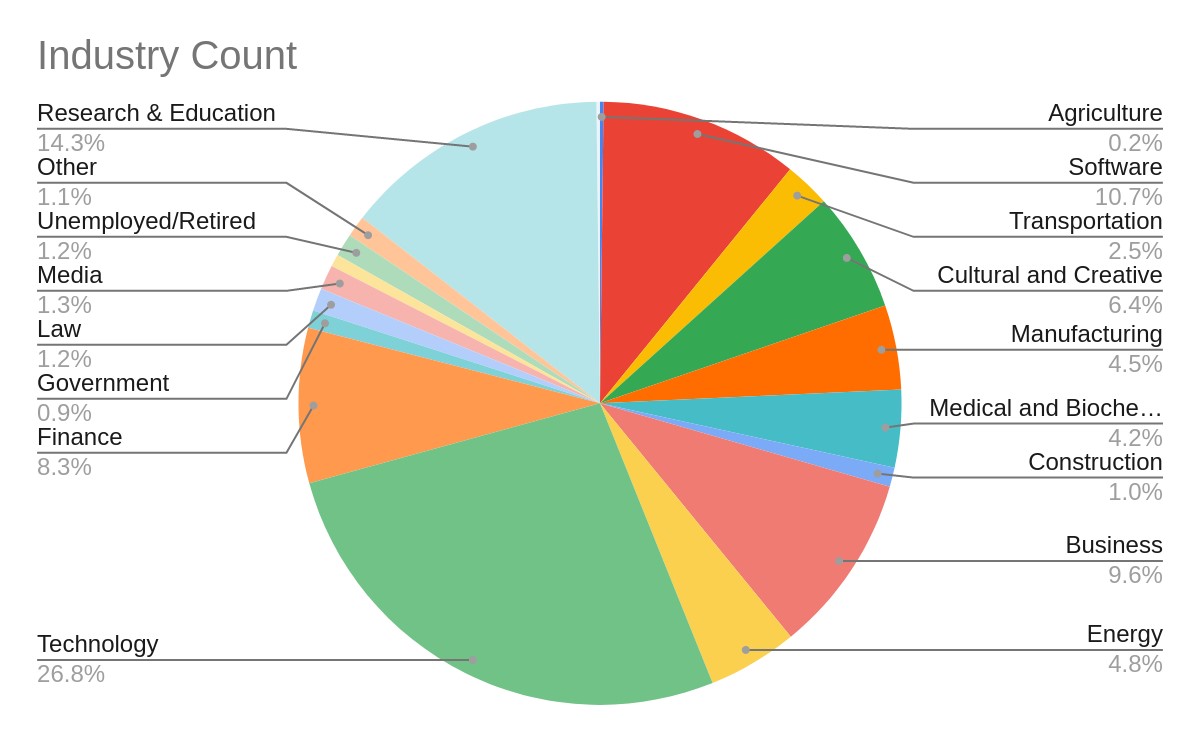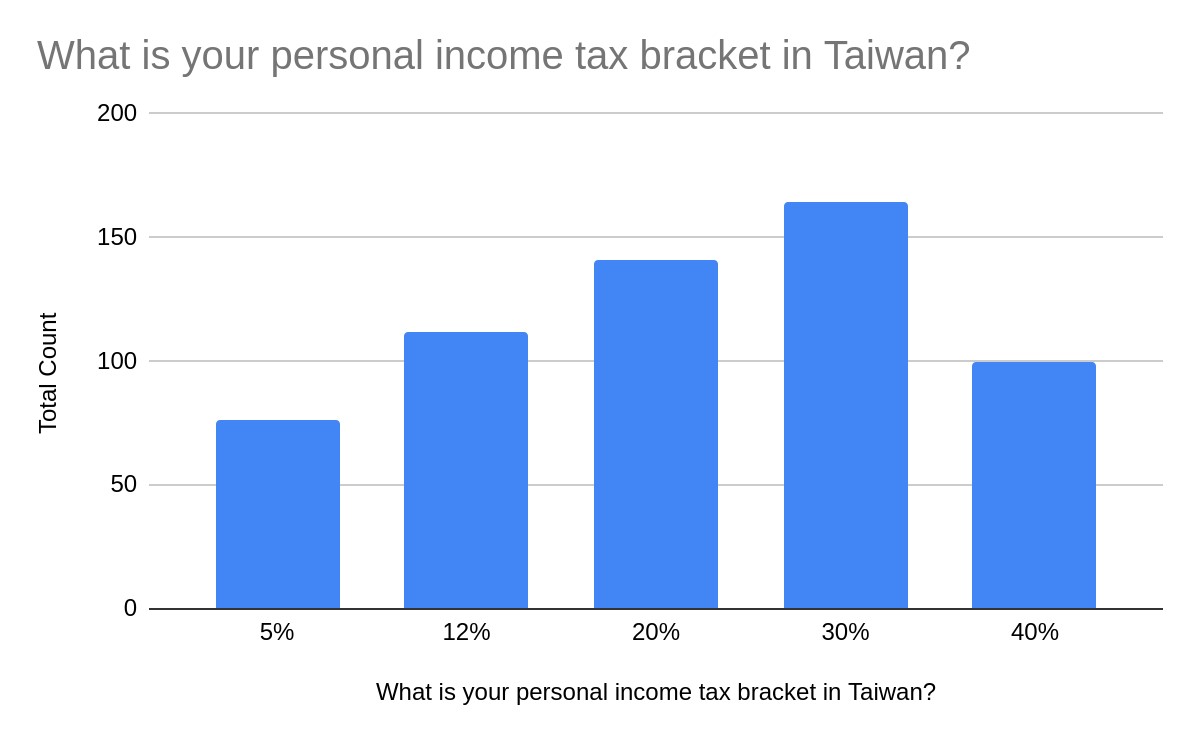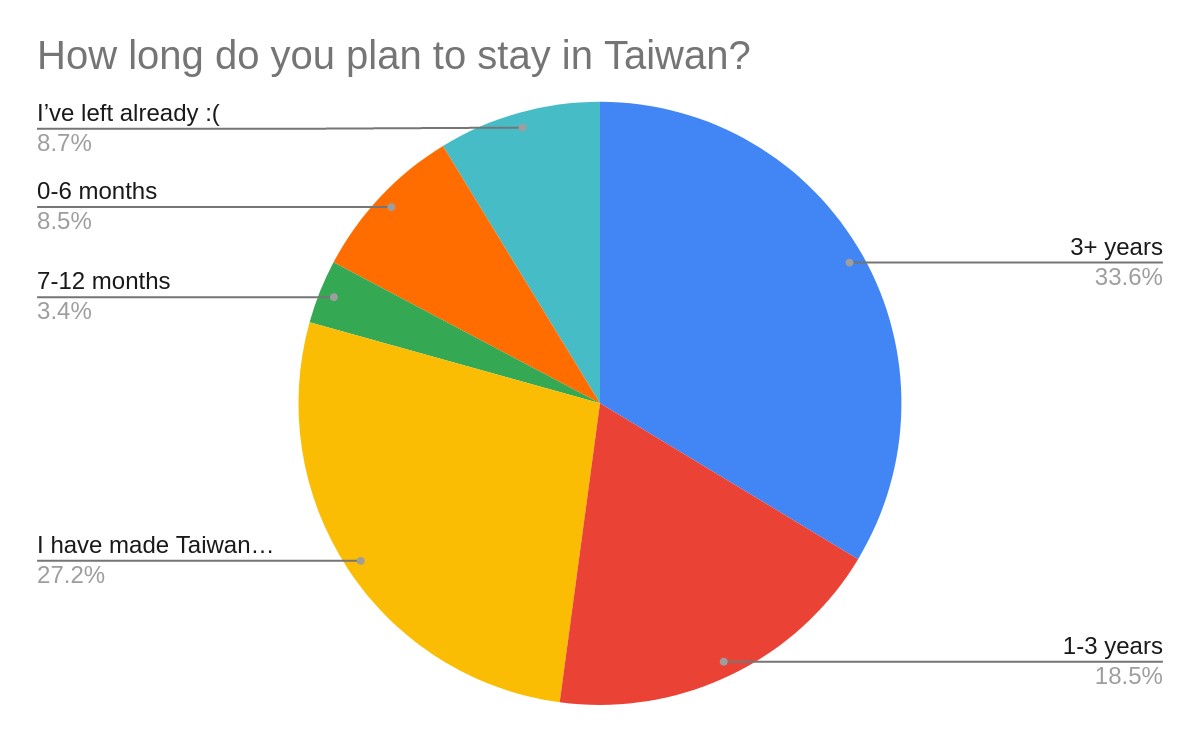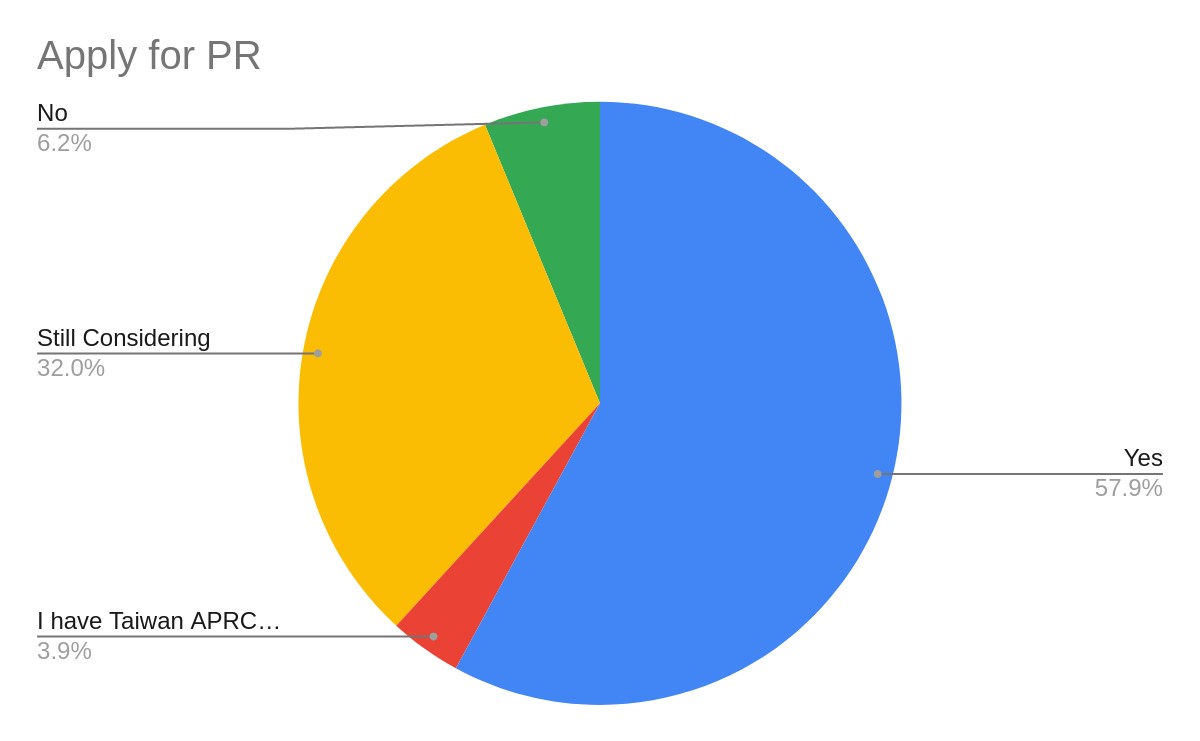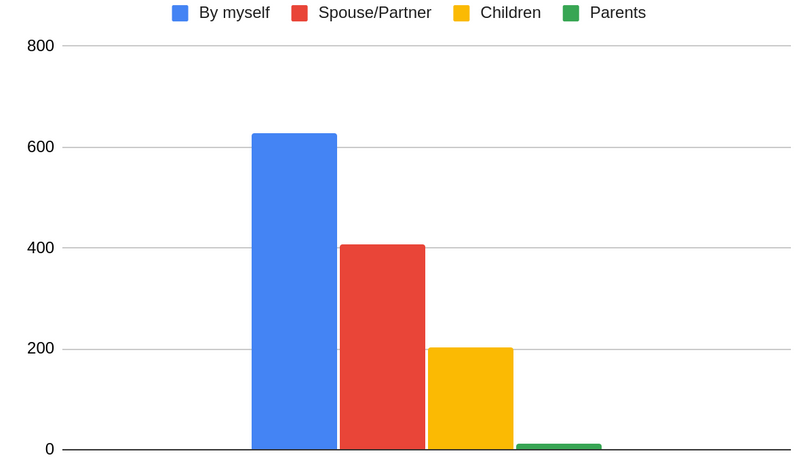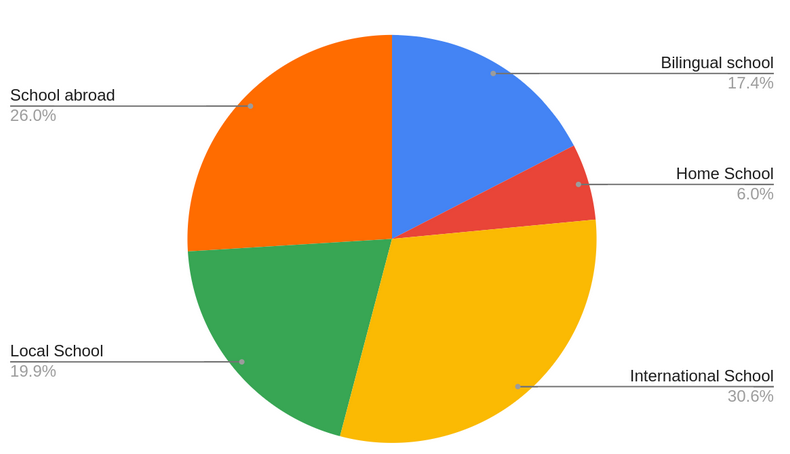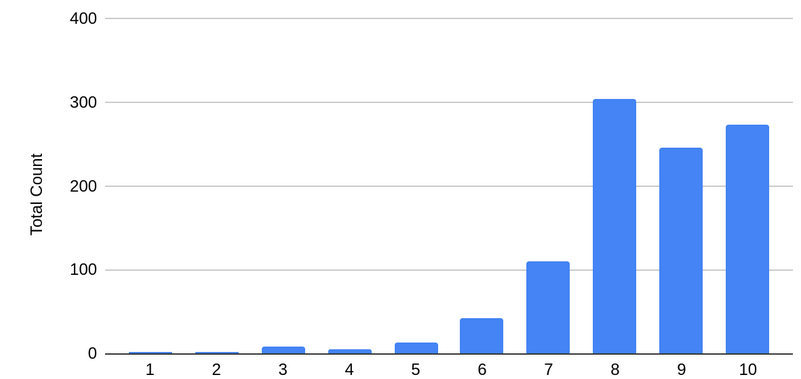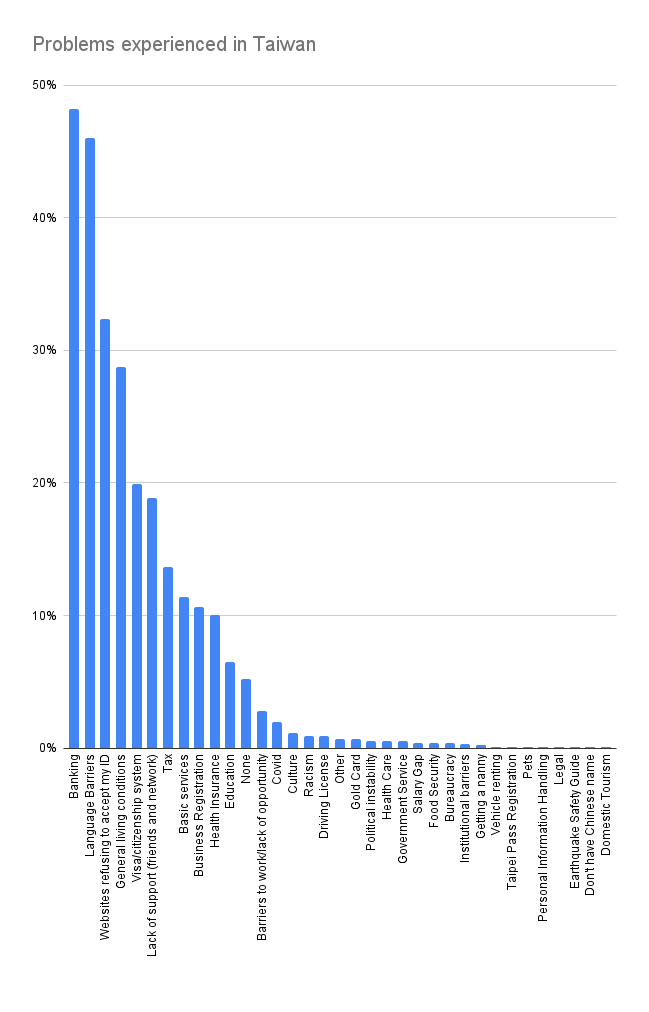
Gold Card Community Survey 2022
From July 29th to September 14th 2022, the Gold Card Office conducted a survey of Foreign Special Professionals residing in Taiwan. With 1081 respondents from more than 50 countries, this is one of the largest surveys detailing the individual work situations and perspectives of foreign professionals living in Taiwan.
The majority of respondents (95%) were Gold Card holders. Some highlighted conclusions from this survey include:
- 35% of Gold Card holders are remote workers
- 48% of respondents work in an executive or management role
- 45% reported paying tax in the 30% and 40% rate, the two highest brackets in Taiwan, denoting earnings more than 2.5 million NT per annum.
- Banking remains the #1 issue faced by foreign professionals in Taiwan.
- 79% of Gold Card holders plan on staying over one year, of which 60% plan to stay over 3 years or already consider Taiwan their home.
- 58% of Gold Card holders also plan on applying for permanent residency, with a further 32% still considering.
- Over 90% of respondents have a positive perspective on their experience living in Taiwan.
With the number of Foreign Special Professionals to hit 10,000 by early next year, it is crucial to continue to gather this feedback and improve our nation. The National Development Council and other ministries continue to assess what can be done to make Taiwan an ever more compelling destination for talented professionals.
Demographics
The survey was conducted from July 29th 2022 to September 14th 2022 and had 1081 respondents. It targeted Gold Card Holders, a cohort of foreign special professionals in Taiwan that normally have more than 5 years of professional experience. Accordingly, 95% of respondents were Gold Card holders. However, 2.8% (30 people) noted they had successfully taken advantage of the Gold Card’s fast-track to permanent residence.
More than 50 countries were represented, with responses from people with nationalities such as USA, HK, and India leading the group.
The top ten countries represented in the survey were in close alignment to statistical reports generated from Gold Card Applicant data.
In our 2021 survey, we discovered that foreign professionals are frequent travellers. New migrants often travel back to their home countries to settle affairs or to visit friends/family, and business travellers continue to travel regardless of their home base. These results are reinforced this year. At the time of their response, 59% of Gold Card holders were currently in Taiwan, with about 15% abroad for short term travel at the time of the survey. 5% of respondents were abroad and planning their move to Taiwan, either having just been approved for a Gold Card, waiting for quarantine regulations to lift, finding work, or arranging family visas. 17% of respondents said they no longer lived in Taiwan, but of these many said they still intended to visit frequently.
Discovering the Gold Card
The Gold Card program has ambitious targets, with aims for 10,000 Foreign Special Professionals by 2023, and an additional 10,000 by 2030. Now in its 5th year, we have begun to understand how cardholders discover the program.
The program is sufficiently innovative to be a conversation topic between Friends and Colleagues, with almost 30% of respondents finding out about it through “word of mouth”. In Oct 2020, when the Gold Card Office was established, it began to conduct promotional activities in several areas. These are clearly seen here, with 6% finding out about the Gold Card from the office itself, through activities such as online seminars, and another 9% reading about the Gold Card in the news after journalist interaction with the Gold Card community. The Gold Card Office also invested in a new official website for the program, which several respondents to this question noted as helpful. As the official website is highly ranked in search engines, this potentially accounts for the quarter (23%) of respondents who found out about the program online or through social media.
The support of government agencies from across several ministries is also notable, with the National Immigration Agency, Taiwan’s Diplomatic Posts and Representative Offices, and participating Ministries accounting for a further 5% of discoveries. Gold Card holders themselves are also promoters of the program, with 4% of respondents finding out about the program directly from an existing cardholder. The Gold Card Office has begun a series of initiatives to connect with Universities, Employers and Professional Service firms, with the aim to seek ideas and collaborate to support the program. Each sector was represented in this year’s findings.
Beyond the visa, we also asked respondents to share why they chose Taiwan as a place to live. The responses were as diverse as the cohort. Topping the list was that Taiwan was simply a great country (28%). Unsurprisingly, employment was an important factor (25%), but respondents also noted that Taiwan’s People (19%), Culture (14%) and Environment (10%) were their reasons for choosing Taiwan. Many other attributes, such as Taiwan’s Safety, Food, Democracy, Convenience, and Freedom were also featured.
Professional
This year we dove deeper into Foreign Professional’s employment situation. The first basic question was - what type of work environment people are in. We discovered that more than a third (35%) of Gold Card holders are remote workers, a modest increase since 2021 (31%). Gold Card holders are also highly entrepreneurial, with almost a quarter (24%) freelancing, self-employed, wanting to start a business or already having done so. A further third were working for a Taiwanese company or university, and 5% were actively seeking employment.
We asked respondents to provide their job title and industry. When job titles were summarised, more than 40 different types of job were represented. These can be aggregated into five main roles. We discovered that many Gold Card holders have management responsibilities, with 31% holding an executive role (eg C-suite, country lead, general manager), and a further 17% noting they were a manager or team lead of some kind. 26% of Gold Card holders were working in a Professional position, 15% as Academics and 5% as Artists.
We asked respondents what industry they worked in. Every major sector was represented, with Technology making up the largest portion (26.8%) and Software (10.7%) being the largest specific field.
Many Gold Card holders qualified partially on the basis of their salary. When asked about their tax bracket, 45% of respondents reported that they were paying tax in the highest two brackets in Taiwan, denoting earnings more than 2.5 million NT per annum. This is substantially higher than the average income in Taiwan.
Future Plans
We also asked respondents about their future plans. The majority of respondents indicated that they plan to stay long term, with 27% noting that they consider Taiwan their home. 33% plan to stay for 3 years or more and a further 19% plan to stay for one to three years.
During 2021, Taiwan had many migrants with plans to stay only for a short-term period to wait out the pandemic. However, a majority of these ended up developing long term ties to the island as their length of stay exceeded their original plans. In 2022 we see the trend return to ‘normal’, with most professional migrants intending to stay long-term from the outset, with the number of respondents who plan to stay in Taiwan for only a short-term decreasing significantly compared to 2021, by approximately two thirds.
As the Gold Card is a fast track to Permanent Residence, we also asked respondents if they plan to use this benefit. The majority (58%) responded affirmatively, with a further 32% considering. 4% had already achieved Permanent Residence (or Citizenship) in Taiwan.
When applying for permanent residency, regulations provide three methods for a temporary resident, such as a Gold Card holder, to prove that they have the necessary means to live independently of state support. The first, and most common is to demonstrate a salary above twice the minimum wage, and unsurprisingly 59% of respondents indicated that they plan to use this method. 19% selected the next most common method, demonstrating proof of assets above 5 million NT. Interestingly, more than 16% of respondents noted that they planned to qualify using formal proof of skills. This third option is currently under investigation, as very few qualifications held by Gold Card holders can be used to apply using this method.
We also asked respondents if they anticipated any issues in applying for Permanent Residence. The majority of respondents (69%) did not expect any issues. However, amongst the third that did, 26% noted the issues faced by Hong Kong passport holders and 17% noted potential issues with the salary or skill qualification. Almost 38% noted issues with the process, such as background checks, policy changes, lack of information or problems with the transition from other visas.
Family and Education
Family is an integral part of our culture in Taiwan, and we welcome families to migrate here. To better prioritise services we asked respondents whether they moved with family and about plans for children’s education.
32% of respondents noted that they had children, though not all moved with their children. Of those who had children they had 1.17 on average, with the average age of children across all respondents being 13.45 years (an increase of 3 years compared to 2021, likely due to more accurate survey data). For children of school age, the largest fraction were attending local schools (37%), divided approximately in half between bilingual schools (17%) and regular schools (20%). The next largest portion were attending International Schools (30%), with 26% attending school abroad (including those taking remote online classes). A minority (6%) were homeschooling their children.
Compared to 2021 data, this represents a 10% increase in those families utilising international schools, and a 5% increase in those children attending school abroad. Bilingual local schools became more popular (+4%) while regular schools became a less popular choice (-17%). These changes are likely due to having a larger cohort, improving survey accuracy, the increased focus on Gold Card holders, and the opening of additional places in bilingual and international schools for the 2022 school year.
Perspectives on Taiwan
When asked if the respondents were enjoying their overall time in Taiwan, on a scale of 1-10, from “horrible” to “amazing!”, the average score was 8.5, a marginal decrease from the 8.7 score in 2021. Over 90% of respondents have a positive perspective on Taiwan.
We want Taiwan to be a friendly and enjoyable place to live for everyone, so we pay particular attention to any negative experiences foreign professionals have and work to address them.
In 2022, banking is the top issue, with almost half of respondents (48%) noting issues with banking services, while language barriers remained second (45%). These issues ranked the same in 2021, but both problem categories saw a minor decrease from 2021 to 2022 (-6% and -1% respectively), hinting that current efforts to improve banking for foreign nationals, and move toward a bilingual nation may be beginning to have impact.
Those who encountered a website refusing to accept their ID number saw no change since the 2021 survey, with 32% of respondents continuing to report this issue.
For the first time, in addition to gathering quantitative data, we encouraged respondents to share stories about their experiences in Taiwan, both positive and negative.
Two government organisations that typically don’t draw much praise in other countries were rewarded with unusually many positive comments. 3% of respondents shared positive comments about the taxation bureau, and several respondents noted very positive experience with the Department of Motor Vehicles.
“Never had to wait at the tax office, staff can speak English and has been helpful every time I went there.”
“At the tax bureau, gold card is easily recognized unlike a few years ago. The administrative staff know how to handle it and tax filing is a breeze.”
“Visiting the DMV to get a license renewed was super fast and easy. ”
“The Motor Vehicles Office has always been friendly, helpful, and efficient. Even changing ID numbers on a license was a breeze.”
Despite covering a small geographic area, Taiwan’s strength in outdoor activities and diverse arrange of domestic tourism options was clearly noted.
“We enjoy the accessibility of outdoor activities and parks for our son. ”
“My wife and I go each sightseeing spots almost every weekend. It’s really enjoyable ”
“I love hiking so I climbed to Jade and Snow mountains, which were wonderful moment to be on the top.”
When asked to provide feedback on times when something went wrong in Taiwan, 40% declined to provide an answer, and a further 6% noted they had not had any negative experiences. There were more than one hundred unfortunate stories about banking, noting Taiwan’s outdatedness, inflexibility, and time-consuming processes.
“Endless, endless problems with banking. Anything to do with anything to do with banking is complicated, onerous and time consuming. If there was one thing I could change about Taiwan it would be for it to get on board with modern banking systems.“
“I received a cheque in my Chinese name and was told I cannot deposit it in my bank account, because the cheque must be in my English name, even though my passport, IDs and Gold Card has both Chinese and English names“
“Setting up a bank account is very cumbersome with multiple visits needed to the bank“
“Establishing banking accounts was an archaic experience that took almost a month and a lot of creativity.“
“Banking sector is very old school compared to many Asian countries and discriminate foreigners. E.g. All digital banks don’t accept ARC holders to open accounts.“
This feedback on poor processes was not limited to the Banking arena, noting that access to other basic services, such as phone plans, required assistance from friends and colleagues.
Further Studies
The Gold Card Office plans to conduct this study yearly, in the third year of data collection in 2023 we will be able to analyse trends across the past few years. The Gold Card Office is also interested in collecting more detailed information about why Gold Card holders choose to live where they do, in order to assist with the nation’s urban planning regime.

